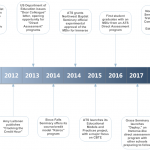What is CBTE?
Competency-based theological education (CBTE) represents a paradigm shift in theological education. Focused on “mentored mastery in-context,” CBTE offers an innovative way for seminaries and learning networks to raise a new generation of proven leaders, trained in-context, in the knowledge, skills, and character traits they need to prosper in their callings.
Competency-based education is not a new idea. When the goal of a program is vocational preparation, it goes to reason that its outcomes and context should emulate the vocation as much as possible to make the transition from training to practice seamless. In some industries, mentored training designed around a specific set of competencies has been the primary training model for decades. Even in theological education, the ministry practicum has been central to programs for years.
A Brief History
 Competency-Based Education grew out of educational experiments in mastery learning, learning from apprenticeship and CBT models developed within industry and the trades. Early experiments grew out of schools like Western Governors University and encouraged by early adopting states like New Hampshire and Ohio.
Competency-Based Education grew out of educational experiments in mastery learning, learning from apprenticeship and CBT models developed within industry and the trades. Early experiments grew out of schools like Western Governors University and encouraged by early adopting states like New Hampshire and Ohio.
Competency-based theological education (CBTE) grew out of a need to re-think pastoral training. Pastors were being prepared for vocational ministry in a primarily academic setting, and upon graduation, students were proficient at writing papers and exams, but not always ready or equipped for success in the field.